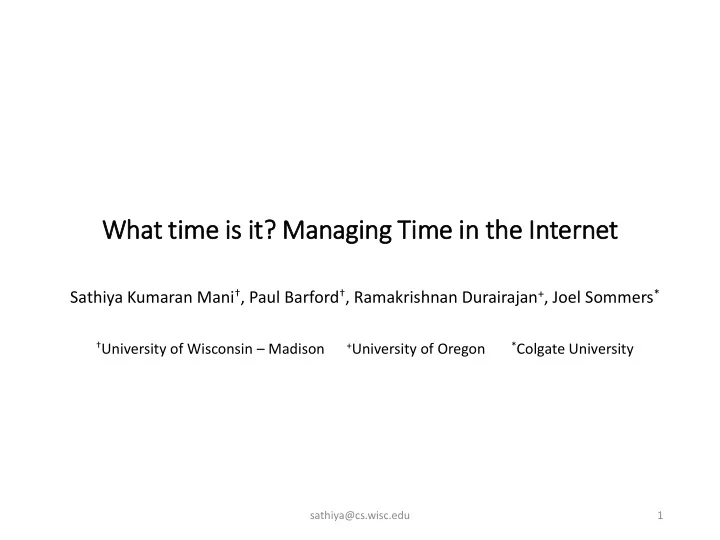

What tim ime is is it? it? Managin ing Tim Time in in the In Internet Sathiya Kumaran Mani † , Paul Barford † , Ramakrishnan Durairajan + , Joel Sommers * † University of Wisconsin – Madison + University of Oregon * Colgate University sathiya@cs.wisc.edu 1
Motivation • Internet time synchronization is performed on UTC • People- facing applications: UTC → current local time • Notoriously difficult to deal with time zones correctly • Account for Daylight Saving Time (DST) rules, which are changed often • Samoa skipped a day in December 2011 sathiya@cs.wisc.edu 2
Background • Time zones originated to standardize current local time – coordination of railway and telegraph networks (late 19 th century) • Arrival of World War I led to creation of DST in 1918 • Knowledge/handling of time zone is necessary for modern day applications – meetings on calendars • Time Zone Database (TZDB), is a critical asset in handling time zones • TZDB was created by Arthur David Olson in the early 1980s sathiya@cs.wisc.edu 3
Background • TZDB consists of zone definitions and rules for every time zone – both historical & current # Zone NAME GMTOFF RULES FORMAT [UNTIL] Zone America/New_York -4:56:02 - LMT 1883 Nov 18 12:03:58 … -5:00 NYC E%sT 1967 -5:00 US E%sT # Rule NAME FROM TO TYPE IN ON AT SAVE LETTER/S … Rule US 2007 max - Mar Sun >=8 2:00 1:00 D Rule US 2007 max - Nov Sun >=1 2:00 0 S • Organized as text files, reference implementation - C API functions and utilities sathiya@cs.wisc.edu 4
Background • Placed in public domain in 2009 by Olson; not “owned” by anyone • TZDB is hosted by IANA and update process defined by RFC 6557 • Maintained by volunteers and primary maintainer for the past 26 years • Currently, primary maintainer is Paul Eggert of UCLA • Most recent version of TZDB has 348 time zone records • Consumed by almost all major hardware, OS vendors and programming libraries – GNU Linux, Android, iOS, pytz (Python), Joda-Time (Java) etc. sathiya@cs.wisc.edu 5
TZDB update process • Time zones – managed/updated by local government authorities • TZDB community discuss changes – TZ mailing list • New TZDB release created by maintainer and published • Onus on consumers to update their versions – OS updates • Delay in updating TZDB version can cause disruptions • Case study : Turkey Elections, 2015 Given the practical and extremely wide-spread use of TZDB it is important to understand its evolution. sathiya@cs.wisc.edu 6
Data used for analysis • TZ database source files from 240 releases, 26 years (1993 – 2019) • Entire TZ mailing list archives, 33 years (Nov 1986 – May 2019) • We built a Python parser tool to, • Process zone/DST rules • Detect updates – effective changes between consecutive releases • Identify corrections – updates to previous updates • 2,283 updates to zone and DST rules identified – with 427 correction updates sathiya@cs.wisc.edu 7
Maintenance perspective • DST - huge influence on managing current local time on connected devices • Majority of updates affect timestamps in the past • ~80% of updates made within 100 days from date of effect – 20% within 15 days or less sathiya@cs.wisc.edu 8
Community perspective • 1,891 unique contributors sent 19,367 emails over 33 years • Increasing trend seen after 2012 adoption by IANA • Trends correlated with increasing usage of TZDB particularly due to adoption of mobile/smart devices • Relatively large no. contributors is a potential concern sathiya@cs.wisc.edu 9
Geo-Political perspective • Reasons for DST rules changes are often administrative • To evaluate this hypothesis, we analyzed rule change frequency • We generate histogram of rule changes for each time zone • We group time zones by country and look at history • TZDB provides unique perspective on historical events sathiya@cs.wisc.edu 10
Problems related to TZDB updates • Highlight importance and impact of TZDB updates • Correction updates – 19% of updates are corrections • Incomplete information released by authorities • Errors – highlight problems in informal update process • Identified and later fixed by contributors • Software bugs – Broke OpenJDK, Qt etc. • Delayed updates – Issues with Android/ iOS users in Israel, Turkey sathiya@cs.wisc.edu 11
Recommendation objectives • Intention – not to impugn individuals who have contributed time & energy • We hope to expand perspective and start discussions • We do not provide any implementations – use standard tools • Intentionally high level – details to be fleshed out within the TZDB community sathiya@cs.wisc.edu 12
Our recommendations • Codification of update process • Introduce formalization – release cycles, documentation, ticketing system and tests • Secure the update process against, • Impersonation of a TZDB contributor or authority or Coordinator • A motivated attacker or e.g., a government entity may use current processes to facilitate malicious/unwanted updates to TZDB • Audit TZDB updates – by independent third party, well documented sathiya@cs.wisc.edu 13
Summary • We examine the evolution of the TZDB - a critical asset for reporting current local time • We consider TZDB maintenance and update processes and elucidate anomalies and potential vulnerabilities • We propose updates to the current system to enhance security and integrity S. Mani, P. Barford, R. Durairajan, and J. Sommers. “What time is it? Managing Time in the Internet", To appear in the proceedings of The ACM, IRTF & ISOC Applied Networking Research Workshop, 2019 sathiya@cs.wisc.edu 14
Thank you for your Time! Questions? Thanks to the TZDB community for their efforts in maintaining this critical database. All the data and code from our study is available at: https://github.com/satkum/tzdb_analysis sathiya@cs.wisc.edu 15
Recommend
More recommend